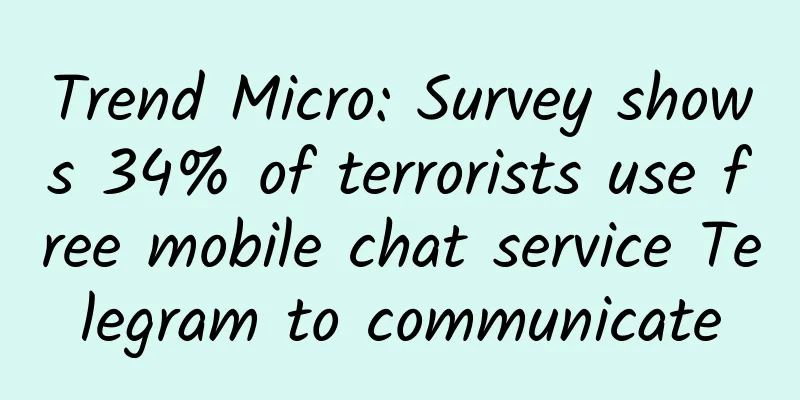Trend Micro: Survey shows 34% of terrorists use free mobile chat service Telegram to communicate

|
Telegram Technology is developing at a rapid pace, and terrorists are also keeping a close eye on the trends. A new study on terrorist communication methods released by cybersecurity company Trend Micro shows that 34% of terrorists use Telegram, a free mobile chat service, to communicate. The study confirms previous research that the extremist group Islamic State (IS) uses Telegram for secret information exchange. Tracking IS becomes more difficult Terrorists use the Internet to conduct cyber attacks, communicate, raise funds, recruit and train personnel, coordinate and plan attacks, and other activities. The reasons behind this are not difficult to understand. First, the Internet provides a large number of potential audiences. Second, it is easy to log in and can be anonymous. In addition, information spreads quickly, making government supervision more difficult. The inventor of Telegram is a Russian technology entrepreneur who emphasizes privacy and freedom. It has the characteristics of anonymity and information encryption. Telegram The researchers monitored forums where terrorists were active and categorized information from 2,301 accounts. In addition to Telegram, other free chat applications popular among terrorists include Signal, Facebook's WhatsApp, and Wickr, each of which is used by about 15% of terrorists. The report shows that WhatsApp's popularity among terrorists has declined after it was reported that investigators successfully arrested 16 suspects by monitoring WhatsApp. A small number of terrorists also use more niche chat services such as Surespot and Threema. All of these chat apps offer encryption, which converts text conversations into gibberish, a technology that makes it difficult, and sometimes impossible, for governments to monitor terrorists. In fact, experts say tracking IS is becoming more difficult. James Comey, director of the Federal Bureau of Investigation (FBI), once warned that encryption allows terrorists to hide their plots. However, if encryption is restricted, exposing daily communications such as bank information to hackers and terrorists will also have disastrous consequences. In terms of email, Gmail is a common email service among terrorists, with about 34% using Gmail. This phenomenon shows that terrorists have gathered around the world's most popular email service. Although the names of email users are still hidden, the FBI can track the actual location of Gmail users by asking Google to provide the user's unique IP address. FBI agents are said to do this frequently. The second and third most popular email services are Mail2Tor and SIGAINT, both of which are used by nearly 20% of terrorists. These two services are particularly difficult for law enforcement to track because they operate largely in the anonymous Internet domain Tor. Tor is a system that encrypts information and "bounces" Internet signals back to the global Internet. It can help you escape censorship when browsing the web and hide the real location of your computer. Of course, it can also hide who is using Mail2Tor and SIGAINT services. While there is some evidence that the FBI has been able to hack into Tor accounts and find out the user's true geographic location, it's not clear whether this is a generally applicable strategy. The above study shows that fewer terrorists use RuggedInbox and Yahoo Mail. Customization tools Trend Micro also studied "custom" tools developed by terrorists themselves. A tool called Mojahedeen Secrets, which can encrypt emails, was launched in 2007 as an alternative to the popular privacy software PGP. This is the first professional software created specifically for IS terrorists, and it is not clear who developed it. Customization tools The terrorists also developed a tool called Asrar al-Dardashah, which can be easily embedded in the global chat software Pidgin to encrypt conversations between AIM, Google Talk, MSN and Yahoo accounts. According to the above research report, this software was created for terrorists by a professional company. In 2013, a group called the Global Islamic Media Front developed Tashfeer al-Jawwal, an app that can encrypt mobile devices. In the same year, a group called the Al-Fajr Technical Committee developed Amn al-Mujahed, a tool that can encrypt emails and text messages. However, according to cybersecurity expert Robert Graham, not all tools work properly. It is still a challenging task for terrorists to develop encryption tools themselves. He said: "Some of their tools are just a rebranding of existing (Western-developed) tools. And some tools developed with new codes are likely to make them caught by law enforcement agencies. Even professionals like me have concerns about writing new code." |
<<: How to care for breasts scientifically?
Recommend
How to exercise women's private parts to make them tighter
After a woman has given birth to a child, it is m...
What to do with breast duct hyperplasia
I don’t know if you have ever experienced breast ...
What to do if you have edema in early pregnancy
Ten months of pregnancy is a particularly difficu...
No menstruation for more than a year during breastfeeding
I believe many mothers know that menstruation wil...
What is the reason for heavy menstrual flow?
Many female friends find that their menstrual flo...
Is it safe to eat the Basa fish that costs only a few dollars a pack in the supermarket?
Have you noticed that restaurants love to use Bas...
Can I eat dried shrimps during menstruation?
Menstruation is something that every woman will f...
What causes uterine myositis?
Myometritis is a serious disease for women. When ...
Brown liquid during menstrual discharge
Some brown liquid will flow out before the end of...
Tracking 450,000 people found that people with these 5 lifestyles live longer!
Not long ago, scholars from Peking University ana...
What causes stomach pain and bloody vaginal discharge?
Due to the complexity of their body structure, wo...
Is 1.0 cm of pelvic fluid serious?
For women, the pelvis is a very important part. I...
What are the harms of wearing a ring to women
At present, there are various contraceptive metho...









